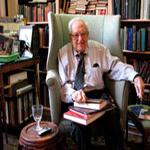A Visit with Irving Kahn
Mark Bartlett | From the Library Notes Newsletter, Saturday, March 1, 2008
Since becoming Head Librarian in 2006, I've talked to Irving Kahn on the telephone several times. Last November, I had the pleasure of meeting him at his apartment near the Library. It was wonderful to discuss so many different things and to hear Mr. Kahn's thoughts about the Library, books, publishing, and more.—Mark Bartlett
"Look ahead and don't be pessimistic" is Irving Kahn's advice for a long life. At age 102, Mr. Kahn is the Library's oldest member, and he continues to keep our Circulation and Acquisition departments on their feet with his lively curiosity and love of learning.
Mr. Kahn has been a member since 1980, when his late wife, Ruth, a great reader whose favorite author was Agatha Christie, introduced him to the Library. Mr. Kahn's own reading tastes lean towards nonfiction, although as a boy he was fond of science fiction and was quite taken by Jules Verne's Around the World in Eighty Days. He owns thousands of books, mostly nonfiction, and he emphasizes that they are definitely for reading, not collecting. He is interested solely in a book's content and is much less impressed by the aesthetic or dollar value of a first edition.
Mr. Kahn's daily reading also includes a healthy dose of financial magazines and journals, like the Financial Times and the Economist. These are crucial to his work as Chairman of Kahn Brothers & Co., Inc., the investment firm he founded with his two sons, in which he is still an active participant. Mr. Kahn is well known and respected for his remarkable career on Wall Street as an American value investor. It began when he worked at Columbia University as a teaching assistant to the legendary Benjamin Graham, several of whose influential books on investing are in the Library's collection. Mr. Kahn prepared statistical material for Graham's landmark Security Analysis, and his Storage and Stability: A Modern Ever-Normal Granary was reissued in 1998 with a new introduction by Mr. Kahn.
Mr. Kahn is as analytical when it comes to libraries and the future of the book as he is when researching undervalued stocks. While he sees the advantages in online and digital technology, he notes that the ease of digitization has resulted in great quantity and seriously limited quality. He admires Wikipedia "for its good intentions" but is concerned with its gaps in verification. He finds as much ongoing value in his copy of the now classic Eleventh Edition (1910-1911) of the Encyclopaedia Britannica. Even though he laments changes in the book industry that place too great an emphasis on "what the masses want" but not necessarily on what is good for readers, he has high praise for the American book publisher Dover Publications. Dover (acquired by the Courier Corporation in 2000) is known for its print reissues of classic and historical books that are in the public domain—as Mr. Kahn notes, these are books "so good that they outlive their copyright."
Mr. Kahn is pleased that the Library continues to house and purchase such good books and journals and recounts that it has been a great resource over the years for interesting titles. He calls the story of the New York Society Library a unique one, "born as the first library in a British colony called New York, with a bias for very good books out of London for the great benefit of people."
We are proud that Irving Kahn's own unique story has been a part of ours for almost thirty years.

